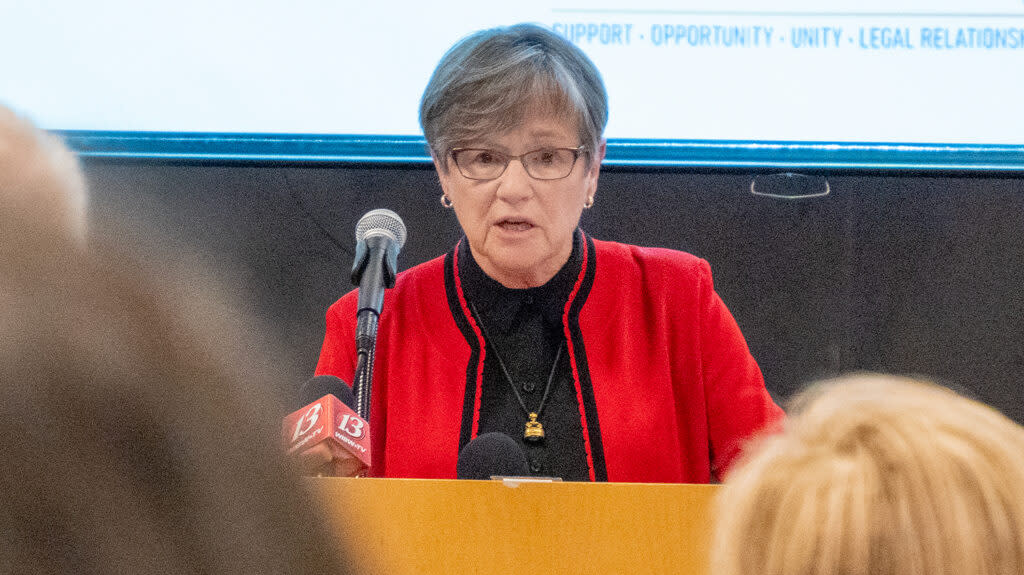Kansas governor signs school funding bill with $75 million boost for special education

- Oops!Something went wrong.Please try again later.
Gov. Laura Kelly signed legislation to continue fully funding K-12 public schools and close the gap on special education needs. (Sherman Smith/Kansas Reflector)
TOPEKA — Gov. Laura Kelly signed legislation that allocates $6.6 billion to K-12 public schools, including $75 million in new money for special education, but vetoed language designed to funnel safety grant cash to a specific software company.
The Democratic governor and Republican legislators separately claimed credit for continuing to fully fund schools, as required by the state’s constitution and mandated by the Kansas Supreme Court. House Bill 387 passed the House 115-2 and the Senate 35-2 on April 26, shortly before the Legislature adjourned for the year.
The legislation includes $4.9 billion in state spending for the public school system.
“Once again, the House and Senate have come together to fully fund education in our state, ensuring that every student has the resources they need to succeed,” said Rep. Blake Carpenter, R-Derby. “This budget also includes full funding for special education, demonstrating our commitment to supporting all students and addressing their unique needs.”
Kelly’s message to lawmakers in signing the bill referenced the state’s historical failures to provide adequate and equitable resources to public schools.
In 2018, when Kelly was still a state senator, the Legislature adopted a five-year plan to fully fund schools by the 2022-23 school year. As governor, she worked with lawmakers in 2019 to correct a math problem and add an ongoing inflation adjustment to win approval from the Kansas Supreme Court. The court retained oversight of the case to ensure the Legislature didn’t pull the rug out from under schools as it had repeatedly in the past, then let go of the case earlier this year.
“When I became governor, my first order of business was to end the cycle of school finance litigation caused by years of underfunding,” Kelly said in her written communication to the Legislature. “Reckless leadership and mismanagement of the state’s finances made it impossible for the state to adequately fund our schools. Since then, we’ve seen how investment in our education system pays significant dividends for our entire state. Students now have more opportunities than ever to explore their educational and professional interests. Our commitment to fully funding public education better supports teachers, paraprofessionals, and administrators.”
Lawmakers agreed to address a longstanding shortfall in special education funding by adding $75 million to the budget. But they stopped short of meeting recommendations from a special task force, which said lawmakers should add $82.7 million annually for four years in order to comply with a law requiring the state cover 92% of extra costs for serving students in special education.
“This funding will provide critical support to districts that have been shouldering the burden of the state’s decade-long failure to meet its statutory obligation and ultimately its promise to the next generation of Kansans,” Kelly said.
At one point this year, the Legislature considered rewriting state law to permanently underfund special education.
Kelly said the new money would allow districts to “properly invest in special education educators” rather than redirect funding that otherwise would be used on teacher salaries and other instruction programs.
“While this funding is a critical first step, it is just a first step,” Kelly said. “We must continue to increase special education funding in future years.”
Sen. Molly Baumgardner, a Louisburg Republican who chairs the Senate Education Committee, said lawmakers this year focused on crafting a bill that better addresses the needs of students, teachers and staff members.
“Our commitment to distributing increased special education funding in a more equitable way to Kansas school districts was accomplished by collaborating directly with the Department of Education leadership team,” Baumgardner said. “This is an important change for children that receive these special services.”
The governor vetoed language that would have required schools to use the $5 million available through the School Safety and Security Grant program on firearm detection software made by ZeroEyes. The company hired lobbyists in multiple states to try to corner the market on security contracts by inserting restrictions in legislation to undermine the ability of rival venders to bid.
Kelly said the restrictions amounted to a no-bid contract and would restrict schools from using the money on other types of safety needs. She has the authority to use a line-item veto on the policy because it was embedded in a budget bill.
Schools should be able to invest in other school safety efforts, Kelly said, such as updating communications systems, hiring more security staff, investing in physical infrastructure and buying automated external defibrillators.
“We must continue to work together to ensure our students have a safe, conducive environment for their learning,” Kelly said. “To do that, we should not hamstring districts by limiting this funding opportunity to services provided by one company.”
Rep. Kristey Williams, an Augusta Republican who chairs the House K-12 Education Budget Committee, welcomed a ZeroEyes sales pitch in her committee and helped shepherd the earmark into law.
She didn’t mention the governor’s line-item veto in a written statement responding to the signing of the bill.
“Meeting our constitutional obligation plus an additional $75 million for special education shows the Legislature’s commitment to supporting our students, teachers and schools,” Williams said. “With almost $5 billion of state dollars allocated every year, we are also dedicated to ensuring there’s more accountability and transparency as we work toward improved student achievement. Our goal is to graduate students who are career and college ready — which requires a continued focus on outcomes.”
The post Kansas governor signs school funding bill with $75 million boost for special education appeared first on Kansas Reflector.

